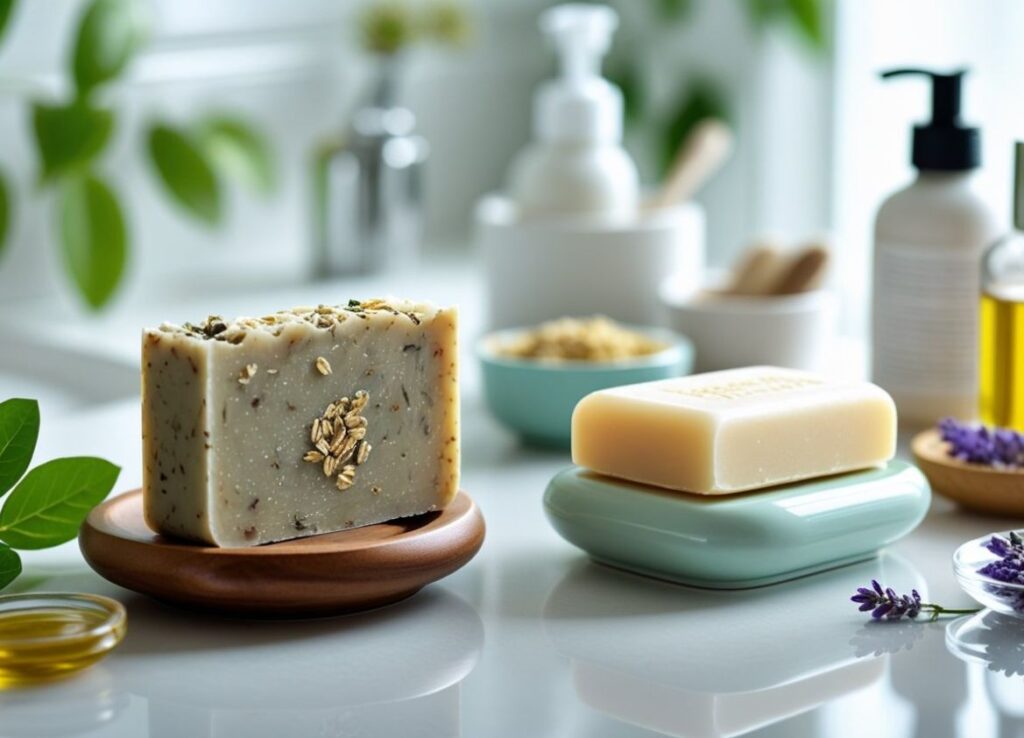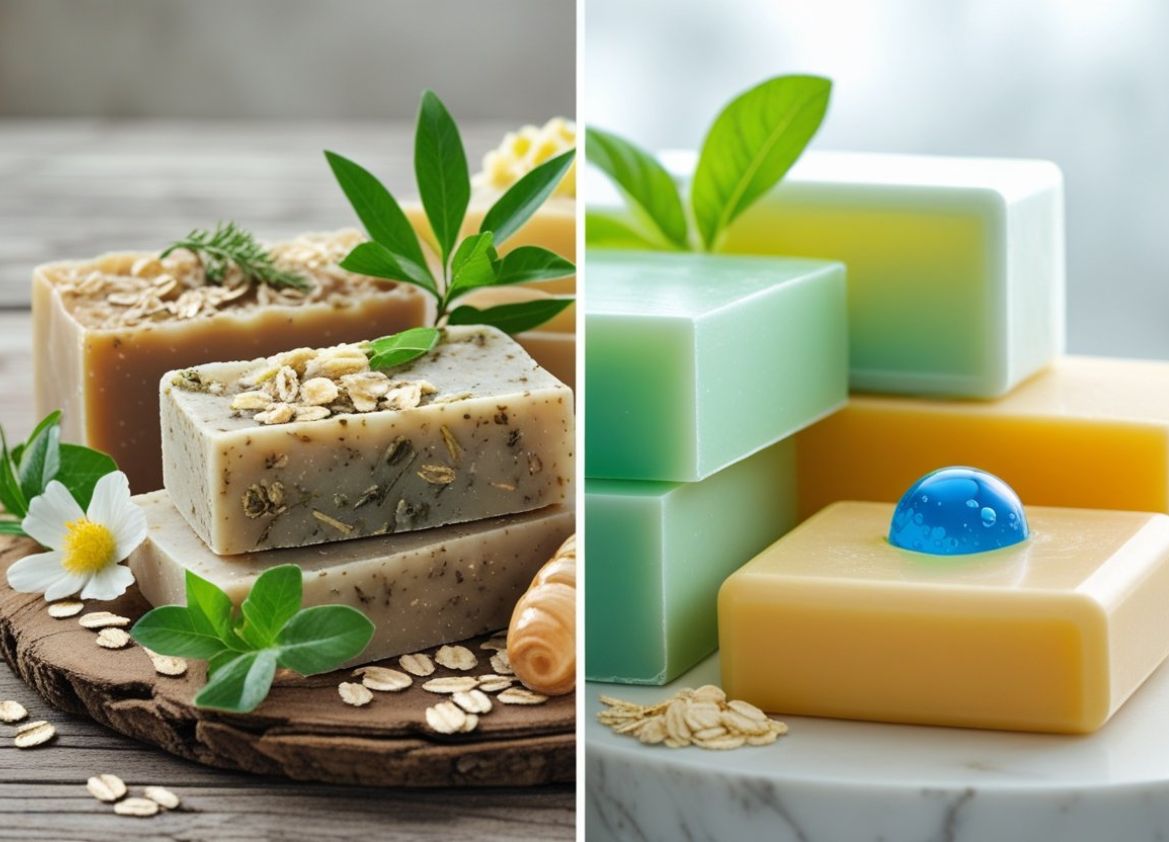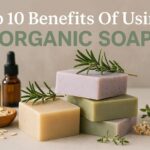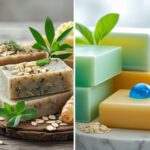When it comes to choosing between natural soap and conventional soap, the decision often comes down to what you want for your skin and overall health. Natural soap is generally better for sensitive skin because it avoids harsh synthetic chemicals that can cause dryness or irritation. Conventional soap, on the other hand, is usually more affordable and widely available, but it often contains detergents and additives that may strip away moisture.
I’ve looked closely at how each type of soap is made and what ingredients go into them. Natural soap relies on plant-based oils and butters that help nourish the skin, while conventional soap often uses synthetic fragrances and preservatives to extend shelf life. Understanding these differences makes it easier to see why some people swear by natural options for daily use.
Beyond personal skin health, I also consider the bigger picture. Natural soap often uses eco-friendly production methods and biodegradable ingredients, while conventional soap manufacturing can contribute to environmental concerns. By weighing both skin benefits and environmental impact, you can decide which option truly fits your needs.
Natural Soap vs Conventional Soap

I notice clear differences between natural and conventional soap when I look at what goes into them, how they are made, and the types of additives they contain. These factors affect both skin health and how environmentally friendly the product is.
Ingredients and Formulation
When I compare natural soap to conventional soap, the ingredients stand out first. Natural soap usually contains plant-based oils like olive, coconut, or shea butter. These oils react with lye to form soap and glycerin, which helps keep skin moisturized.
Conventional soap often replaces natural oils with synthetic detergents. Ingredients such as sodium lauryl sulfate (SLS) are common because they create a strong lather. However, SLS can strip away natural oils, leaving skin dry.
Another difference is glycerin. In handmade soap, glycerin remains in the final bar, which helps with hydration. In many mass-produced soaps, glycerin is removed and sold for use in lotions or other products. This makes the soap less moisturizing.
I find that natural ingredients are less likely to irritate sensitive skin, while conventional formulas may contain harsher cleansers that work well for heavy cleaning but not always for daily skin care.
Production Methods
The way soap is produced also matters. Handmade soap is usually created in small batches using traditional cold or hot process methods. This allows the maker to control the oils, scents, and any added botanicals.
Conventional soap is mass-produced in factories. The process often focuses on efficiency and uniformity. To achieve this, companies use chemical stabilizers, preservatives, and artificial colors.
Because handmade soap uses natural oils and avoids high heat, it often retains more nutrients and moisturizing compounds. Factory-made bars are processed to last longer on shelves, sometimes at the cost of skin benefits.
I also notice that natural soap tends to be biodegradable, while some commercial soaps include ingredients that may not break down as easily, which can affect the environment.
Use of Artificial Additives
One of the biggest contrasts is the use of artificial additives. Conventional soap often relies on parabens, artificial fragrances, and synthetic dyes to improve shelf life, scent, and appearance. These can irritate sensitive skin or trigger allergies.
Natural soap avoids these additives. Instead, it uses essential oils for fragrance and plant-based powders or clays for color. These alternatives are less harsh and provide mild benefits, such as soothing or exfoliating effects.
I see that synthetic fragrances in conventional soap can contain dozens of undisclosed chemicals. In contrast, natural formulations usually list every ingredient, making it easier to know what I’m putting on my skin.
This difference can be important for people who want a gentler product without unnecessary chemicals. For more details on how additives differ, you can explore the breakdown of natural vs commercial soaps.
Effects on Skin Health
I notice clear differences in how natural and conventional soaps affect my skin. Ingredients, moisture balance, and the presence of harsh chemicals all play a role in whether my skin feels calm, hydrated, or irritated.
Skin Irritation and Sensitivity
When I use conventional soap, I often see signs of skin irritation. Many commercial bars contain synthetic fragrances, dyes, and preservatives that can trigger redness or itching. Harsh chemicals like sodium lauryl sulfate (SLS) strip away natural oils, leaving my skin tight and uncomfortable.
Natural soaps, in contrast, usually rely on plant-based oils and essential oils for cleansing. These ingredients are less likely to cause irritation, especially when compared to synthetic additives. I find that this gentler approach helps keep my skin barrier intact.
I also notice that irritation varies depending on water hardness and how often I wash. Even with natural soap, over-washing can lead to dryness. Still, the absence of harsh detergents makes natural soap a safer option for reducing sensitivity and flare-ups.
Hydration and Moisture Retention
Hydration is one of the biggest differences I feel between the two types of soap. Natural soap often contains glycerin, a byproduct of the soap-making process that acts as a humectant. Glycerin pulls water into the skin, which helps me maintain softness and elasticity.
Many conventional soaps remove glycerin during manufacturing. This makes them more drying, especially for people like me with naturally dry skin. Instead, they may add synthetic moisturizers, but these rarely provide the same long-lasting hydration.
I also notice that natural soaps enriched with shea butter, coconut oil, or olive oil help restore my skin’s moisture barrier. These oils penetrate the skin and reduce the risk of flaking or rough patches. In contrast, conventional soaps often leave my skin feeling stripped and in need of extra lotion.
Suitability for Sensitive Skin and Eczema
Because I have sensitive skin, I pay close attention to how soap affects flare-ups. Conventional soap can worsen conditions like eczema by removing protective oils and exposing irritated skin to unnecessary chemicals. This often leads to itching, burning, or cracked patches.
Natural soap tends to be more suitable for sensitive skin because of its simple formulations. Brands that avoid synthetic fragrances and rely on organic plant oils reduce the risk of reactions. I find these soaps gentler during eczema flare-ups, especially when they contain soothing ingredients like oatmeal or chamomile.
Still, I know not every natural soap works for everyone. Essential oils can sometimes irritate sensitive skin if used in high amounts. For me, choosing unscented or hypoallergenic natural soap provides the best balance between cleansing and comfort.
Natural Soap Ingredients and Their Benefits
I focus on the ingredients because they decide how well a soap cleans, hydrates, and supports skin health. The most common elements include plant-based oils, natural butters, botanicals, and antioxidants that protect the skin from damage.
Plant-Based Oils and Butters
When I look at handmade natural soap, I notice plant-based oils like coconut oil, olive oil, and shea butter are key. These oils provide cleansing, hydration, and nourishment without stripping the skin’s natural barrier.
Coconut oil creates a gentle lather and has mild antibacterial properties. Olive oil adds moisture and helps soften dry skin. Shea butter is rich in vitamins A and E, which support skin elasticity and repair.
I also value how these oils work together. For example, coconut oil cleans effectively, while olive oil and shea butter balance it with hydration. This combination makes the soap suitable for daily use, even on sensitive skin.
| Ingredient | Primary Benefit | Best For |
|---|---|---|
| Coconut Oil | Cleansing, mild antibacterial | Normal to oily skin |
| Olive Oil | Moisturizing, softening | Dry or sensitive skin |
| Shea Butter | Nourishing, repairing | Rough or damaged skin |
Essential Oils and Botanicals
I find that essential oils and botanicals give natural soap both function and aroma. Ingredients like lavender, chamomile, and aloe vera are common because they calm irritation and support skin balance.
Lavender oil has a soothing scent and can reduce redness. Chamomile provides anti-inflammatory effects, making it helpful for sensitive or allergy-prone skin. Aloe vera hydrates and cools, which is useful for dryness or sun-exposed skin.
These ingredients also replace synthetic fragrances found in conventional soaps. Instead of harsh chemicals, I get a light, natural scent and added skin benefits. This makes the soap more gentle and less likely to trigger irritation.
Role of Antioxidants
I see antioxidants as one of the most important parts of natural soap. They protect the skin from free radicals, which can cause premature aging and irritation. Common antioxidant-rich ingredients include vitamin E, green tea extract, and certain plant oils.
Vitamin E is often added to handmade natural soap for its ability to support skin repair and moisture retention. Green tea extract contains polyphenols that help reduce inflammation. Even olive oil contributes antioxidants that strengthen the skin’s natural barrier.
By using soaps with antioxidants, I help my skin maintain resilience against environmental stressors. This makes the soap not only cleansing but also supportive of long-term skin health.
Environmental and Ethical Considerations
I look at how the soaps I use affect the environment and the values behind their production. Natural soaps often rely on plant-based oils and handmade methods, while conventional soaps may use sulfates, synthetic additives, and mass production that carry different impacts.
Biodegradability and Sustainability
When I compare ingredients, I notice that natural soap usually contains olive oil, coconut oil, or shea butter. These natural ingredients are biodegradable and break down safely in water systems. Conventional soaps often include sulfates and synthetic compounds that can linger in the environment and harm aquatic life.
Handmade soap production tends to use smaller batches and less energy. This reduces emissions compared to large-scale factories. In contrast, conventional soap manufacturing often involves chemical processing and heavy transportation, which increases its carbon footprint.
I also consider how farming practices affect sustainability. Many natural soap makers use sustainably sourced oils, while mass production can contribute to habitat loss when palm oil or similar crops are not responsibly managed. Choosing biodegradable formulas helps reduce long-term pollution and supports healthier ecosystems.
Packaging and Eco-Friendly Practices
I pay close attention to packaging because it often creates more waste than the soap itself. Many natural soap brands use compostable paper wraps, recyclable cardboard, or minimal packaging. By contrast, conventional soaps and body washes often come in plastic bottles that add to landfill and ocean waste.
Some handmade soap makers also reduce packaging altogether by selling unpackaged bars. This lowers plastic use and supports a zero-waste lifestyle. Conventional soap companies, however, rely heavily on plastic shrink wrap or multi-layered packaging that is difficult to recycle.
Eco-friendly packaging does more than reduce waste. It also reflects the ethical practices of the brand. Supporting companies that prioritize recyclable or biodegradable materials encourages wider adoption of sustainable methods across the industry.
For example, many small natural soap businesses highlight their eco-friendly practices, while larger commercial brands often lag behind in this area. By choosing products with thoughtful packaging, I reduce my environmental footprint while supporting businesses that align with my values.











